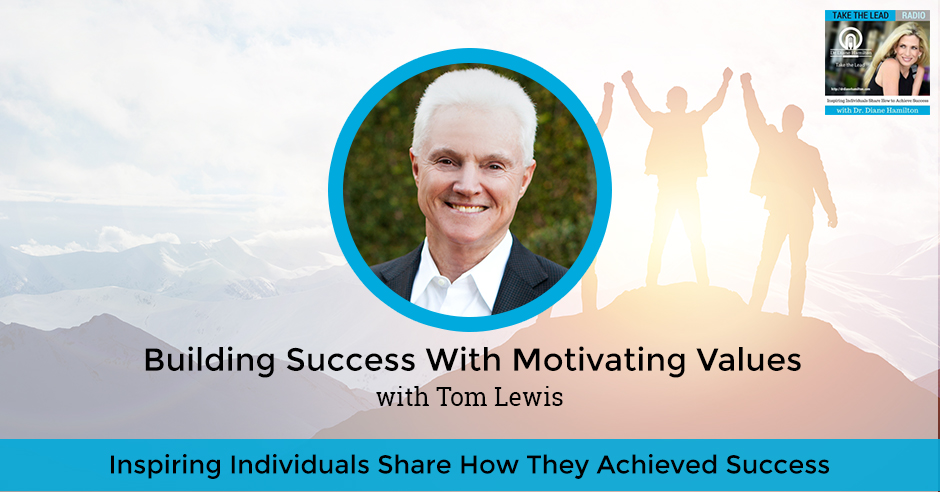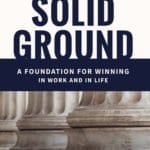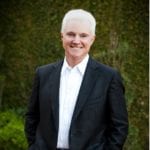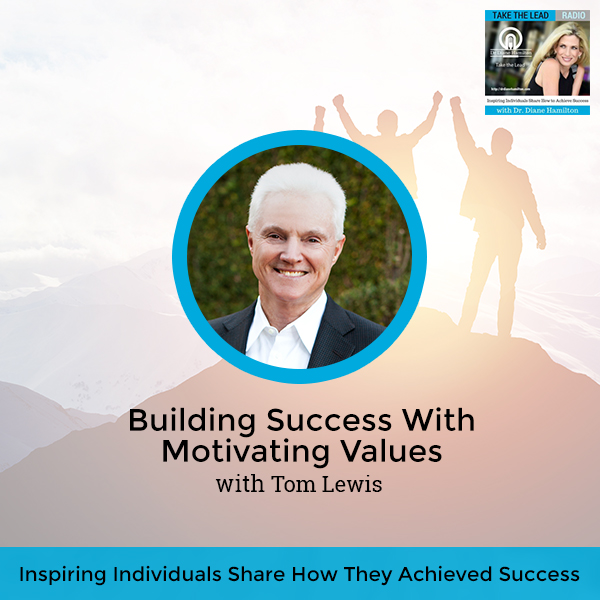How do you build success in business and in life? Drawing heavily from his decades of experience, Tom Lewis thinks building success entails having a clear vision, hard work, building resilience, and aligning your career with your motivating values. Tom is the owner of T. W. Lewis Company, a real estate investment company based in Phoenix, Arizona known for its quality and outstanding customer service in the homebuilding industry. In this conversation with Dr. Diane Hamilton, he pours out a lifetime of lessons that will help you get your business on the right track. Don’t miss this opportunity to learn from one of the greatest builders out there!

I’m glad you joined me because we have Tom Lewis here. He is the Founder, Owner, and CEO of TW Lewis, a company which is based here in Arizona. He’s known for many other things as well, including his book, Solid Ground: A Foundation For Winning In Work and In Life. It’s packed full with so much information about values and how to succeed in business. It’s going to be fascinating to talk to Tom.
—
Watch the episode here:
Listen to the podcast here:
Building Success With Motivating Values With Tom Lewis
I am here with Tom Lewis, also known as TW Lewis. He is the founder of TW Lewis Company, an award-winning Scottsdale, Arizona based real estate and investment company. It’s known for its quality and outstanding customer service in the home building industry. He has received a Lifetime Achievement Award from the Professional Builder Magazine and was the first inductee into the National Housing Quality Hall of Fame. He has done a lot of different work in philanthropy. I’m interested in his work, which is a book he titled Solid Ground: A Foundation For Winning In Work and In Life. I can’t imagine anybody who knows how to do that better than Tom Lewis. It’s nice to have you on the show, Tom.
It’s great to be with you, Diane. Thank you.
I was looking forward to this. You and I met many years ago because our kids have gone to school together. This is fun that we get to meet in a different realm. You’re quite a famous person here in Arizona as it is because TW Lewis does well here. I want to get a little bit of background on you of what led to your interest in going into the real estate business and home building industry and all of that. Can you give me your background a little bit?
In this book that I get into the details of that. To make a short story out of it, I got my Master’s in Business from the University of North Carolina in 1973, my undergraduate degree in Mechanical Engineering from Kentucky, which is where I’m from. I had four different jobs over a period of many years in the real estate business. In each job, I worked for obviously different people. I was lucky to have some great executives to become role models for me. I probably had eight different bosses. I lived in six different states and probably had twenty different jobs.
The point of my book is to show the progression of learning and development. When you graduate from high school, you know so little. Certainly, you look back on that. Even when you graduate from college, you don’t know anything about the real world and you have to learn that yourself. The way you learn that is you watch other people and then you try hard things. The more difficult things you take on, the more adversity you encounter, the more resilience you build, and then you keep repeating that cycle. After about 10 or 20 years, you become smart and resilient. You begin to figure out who you are and what you’re good at. That was the progression that I took over those years.
About halfway through that period, I got a job offer in Phoenix, Arizona, to come out and work for a home building company. That had been the industry I was already in. I came here and continued that. I ended up joining Trammell Crow Company in 1984 and became a partner there. That allowed me to begin to build my net worth as an individual and as an investor. I had the opportunity in 1991 to start my own company. I did that. They called it TW Lewis Company. What I had learned in the home building business was that all the home builders cared about was quantity.
I was a small company. I was going to compete with over 30 large public home builders in Phoenix back in those days. I had to stand out and be different. The way I figured out I could be different and still be myself was to focus on quality and not quantity. I built TW Lewis Company as a small boutique high-end home builder that was doing something no other home builder was doing. It took us a while to figure it out and to get our systems to where they were achieving what we wanted. Ultimately, we were named America’s Best Builder and won the National Housing gold award for quality. It made a lot of customers happy.
You have always got positive press, everything I’ve ever seen in Arizona. It’s a name you can’t miss. I know you do a lot. I saw you had been in Kentucky. My husband did his surgical residency there. I was looking at a lot of philanthropy. You do many different things. I love the quote part of your website. You call it words for wisdom section. I was trying to figure out where curiosity fits into that because that’s what I’m interested in. A lot of the things you focus on, good leadership and success, are the things I focus on. You have a category of self-awareness. I know you have a chapter that focuses on self-awareness. That’s a big part of emotional intelligence. I’m wondering how you got interested in these certain qualities. What led you to these particular foundations of success?
When I was in graduate business school, there was a professor there named Dr. Gerald Bell. He was 28 years old at the time. I had come out of engineering school. I did a 4.5-year program in four years. I never took any electives. I had no background at all in psychology or anything like that. In this grad school course, this professor had written a book called The Achievers where he identified six different categories of people. I’ll never forget what they are. They were the achiever, the commander, the avoider, the attacker, the manipulator, and the pleaser.
Which one are you?

Building Success: The more difficult things you take on and the more adversity you encounter, the more resilience you build.
I’m the achiever.
I am too.
That was the first time I had ever heard that concept that people can be put into boxes. We’re all much more complicated than the six. At that time in my life, I’m 22 years old. I was blown away by that and it’s like, “That explains so much.” I started thinking about all the people I knew and who was what. That got me started on a lifelong passion for personality types. As I got into my career, some of the companies I worked for had me take assessments. They told me things about myself that I had never considered and accepted. I started taking the tests, like the Myers-Briggs and the DISC and the values courses. I used a handwriting analyst one time in a recruiting job. The handwriting analysis is fascinating.
Isn’t it?
It is. There are two things. When I say self-awareness, I’m talking about all of those things. We’re all complicated. We do change some, but not a whole lot. I want young people to understand this as they go through their careers. For example, we have three sons and they’re all great young men, but they have different personalities. The first one in business is an operator. Like me, he’s the person that likes operations. He’s a manager. The second one is a finance person. He’s always been drawn to finance. The third one is a natural salesperson. A persuasive take charge sales guy. Each of my sons exhibits those three different business profiles.
What I learned in my career as I look back are the values that determine your success and how well you can align your career with what I’ll call your motivating values. There are two different types of values. There’s what I call core values. In the book, I’ve listed 100 possible core values, everything from honesty, integrity, humility, perseverance, and kindness. I have a little quiz in there to take. Those are what I call core values. The trick is to come up with your top six. When I started TW Lewis Company, I knew what my top six core values were. They were honesty, integrity, hard work, reliability, compassion, and achievement. Those six values I put up on the wall in the lobby of my company on board and declared that those were our company’s values.
That was an important thing to say to my employees because it lets them know how I expected them to behave and treat each other, our other employees, and especially our customers. Those became the rules of behavior in our company. They were also reminders. We even put them on the back of our business card because we wanted the world to know this is what we stand for. If we say we’re going to be honest, we’re honest. If we say we’re going to do what we say we’re going to do, we do that. For a home builder, I wanted to be reliable. I am reliable. I always had been. Wouldn’t you like to buy a home from a home builder that is reliable?
Yes. It’s important.
It was also a competitive issue as well.
I was wondering. You said there are two values, core values, and is there another category?
[bctt tweet=”What determines your success is how well you can align your career with your motivating values.” username=””]Yes. The second category is the most important, and that’s called motivating values. That is in the DISC format. The DISC is Dominance, Influence, Steadiness, and Compliance. Those are the behaviors and how we behave. What motivates us is something different. The DISC has six different motivating values. There’s theoretical, aesthetic, utilitarian, and traditional. I’ll think of the other ones.
I should know. I always think of the other four. When you get down to it, the other is what motivates us personally. I’m curious about what your DISC type is. Are you a High-D?
You bet.
So am I. Now that we’ve got that, what’s your Myers-Briggs? I’m curious.
I’m right on the border between E and I. I’m a 5. I’m close to the middle of S and N too, Sensing and Intuition, but a total T and a total J.
You’re similar to what I am. I’m an ESTJ. With the T, I had zero F.
Me too, I was zero.
I’ve never heard of another zero. It’s nice to meet you. I am on time. The J thing, that wasn’t even a question.
I didn’t even like to hire people that were not J’s and not T’s. The only time I would hire an F was in sales. In the home building business, you got to make decisions with your head. It’s not a soft industry.
I was in sales for decades. Your kids were in sales. Was it your youngest that went into sales or your oldest? I’m always curious about that.

Building Success: When you start working hard and early, you start learning lots of lessons that you can only learn through hard work.
Our youngest.
My youngest went into sales, who knows your youngest. She and I wrote a book together many years ago about all the different personality assessments like DISC and emotional intelligence and all these things that we’re talking about, which is such a small world.
Let me go back to motivating. There are six of them. Theoretical, that’s a person that values knowledge for knowledge’s sake. A utilitarian is someone who appreciates efficiency and return on investment. Aesthetic values beauty, creativity. Social, that’s the social value that cares about other people. There’s individualistic, which is the ego-driven person, but it also makes you want to get better, to improve so that you can compete and win.
Is that what you are?
My top one is utilitarian and number two is individualistic. Oddly, the utilitarian value used to be called wealth value. The individualistic value is used to be called power value. The words power and wealth are no longer popular.
How do they describe utilitarian?
A utilitarian is someone that cares about efficiency and return on investment. Not only return on your money but return on your time. A utilitarian doesn’t like to waste time.
I don’t at all. That’s funny how much you and I have the same personality quality and things.
My strongest values, I didn’t learn this until I was probably in my 40s, were utilitarian and individualistic. Those are my top two. That explains my success as a home builder, that plus a lot of other things. Those are the two things that got me up every morning and made going to work fun, exciting and competitive. I was trying to build a company, to be recognized, to make money, and to do all the good things that you can do with a company. When I realized that I had found a job and a career that aligned with my values, I thought, “Bingo. That’s the secret sauce right there.”
I’m thinking about how many of those qualities are important. I’ve had a lot of people on the show like Tom Hopkins. I worked on boards with Harvey Mackay and some of the people you probably have had to run across in your time. You’re drawn to these sales competitive businesses if you have these certain qualities. That’s why I always think it’s fascinating to learn more about personality types. Some of them don’t change. Myers-Briggs always said, “This stays the same throughout your life.” A lot of these don’t unless you have these major traumas. Tom Rath was on the show, who wrote StrengthsFinder. I’m curious on how you look at this. Do you do a personal SWOT and develop in the areas where you’re not strong? Do you focus more on your strengths?
[bctt tweet=”Forget your weaknesses. Focus on your strengths.” username=””]You focus on your strengths. That’s my philosophy. You forget weaknesses. I was doing another interview and they asked me how I felt about learning how to play the piano and I said, “That would be a complete waste of time for me.” He laughed and went, “Why do you say that?” I said, “I’m not an aesthetic.” I like to listen to music, but that’s not something I’m particularly good at. I would be a huge failure at it. It’s not fun to do things you’re not good at, so why would I be interested in playing a piano? I would rather learn other skills that fit my value structure.
What skills do you work on that you think would be good to work on then? What talents do you try to pick up if not taking a piano or learning guitar or singing or that type of thing?
I was always focused on a few things. My beginnings were humble. My dad was a military officer. He filed for bankruptcy when I was in high school. He had started a business and failed. I was driven by that. I was in a hurry to succeed. I was focused on two things, building a company and building a family. I had plenty of fun. I played golf. I had lots of friends. I exercise a lot. I didn’t go out and try to find my passion, like playing a piano or collecting stamps or something like that. I was too serious about life and success. There’s a chapter in my book called Hard Work. One of the things in my book that I’m trying to do is to dispel many popular myths that exist out there that undermine people’s success.
One of those myths is 30 is the new 20 and work smarter, not harder. That’s an excuse not to work hard and wait until you’re 30 to get serious. Those were completely stupid things. The point is though when you start working hard and working early, you start learning lots of lessons that you can only learn through hard work. While you’re doing that, you’re encountering adversity, building confidence and resilience. There’s a saying by a Kentucky basketball coach that I love, “Hard work leads to competence. Competence leads to confidence. It takes confidence to succeed. It all starts with hard work.” How do you become competent? You put in the time. You work with what you’re already good at. Michael Jordan, people are watching his show. It’s a classic story of hard work, competence, and talent.
He is an impressive example of that. I’m curious where curiosity falls with you. Have you always been curious about specific things? Do you think curiosity should be encouraged in the workplace? Your insights on that would be interesting to me.
I have a little bit different take on curiosity. In our philanthropy, we have done a lot with public universities.
I saw that in ASU too.
Kentucky and the University of North Carolina. I have a lot of good friends and people that I work with regularly that are in the university community. I noticed that they talk a lot about curiosity. Here’s my opinion and then you tell me because you would have another insight. If you have a high theoretical value, the definition of that is valuing knowledge for knowledge’s sake, you then have a high opinion of the concept of curiosity. My wife and I had a scholarship program for many years. She and I would interview students individually for an hour and we would do about 40 every Spring. I loved doing it. It was fun to talk to these sharp high school kids that had a financial need and wanted to go to great schools. I found a lot of them would talk a lot about curiosity.
They were the 4.0 superstar students. As I learned later, they all also had high theoretical values, which meant that they believed that knowledge was a great thing for its own and was its reward. For me, I’m not a high theoretical value person. I don’t have that. My theoretical value is not that high. To me, I don’t want to learn something unless I can do something with it and it’s useful. There are exceptions to that. In general, I don’t go around thinking, “What am I curious about? What do I want to learn for the sake of knowing so I can talk about it at cocktail parties?” I’m not that interested.
It’s interesting getting away from the status quo, doing the same way of doing business curiosity. Questions are good to ask in meetings. If everybody is in agreement, are you going to get the next great innovative idea curiosity?

Building Success: If you have a high theoretical value, you have a high opinion of the concept of curiosity.
That’s a different kind of curiosity.
That’s more what I deal with. Curiosity is such a commonly used word. If you’ve ever read Mindset by Carol Dweck, you can have a fixed or a closed mindset to think. There’s a lot of research behind curiosity in general. What you’re saying is a lot of people do value knowledge for knowledge’s sake. In the leadership realm, sometimes we’ve inadvertently shut people down on their ideas because we leave meetings and everybody is in agreement and then everybody is afraid to speak up. Did you see a lot of that in the business world?
I’m thinking about a book that Jack Welch wrote years ago, he called it Winning. As I remember, in that book, he talked about how powerful candor was and how rare it was. I can attest to that. Calling it out when something needs to be said and saying it. I’m not sure if that’s curiosity. That’s more candor.
It falls into what I talk about though and it’s important. I have worked with Jack and I’ve had a lot of people on the show talk about Jack, who had worked with him. You’re touching on a lot of words that I find curiosity-based. In your chapter title, you’re finding success and finding purpose. That means seeking, questioning. Do you look at it that way?
Here’s the way I look at it because I’m a High-D, I’m focused on problems. What drives me behaviorally is solving a problem. A High-D like yourself or like me, if you present us with a problem, we can’t sleep until we solve that. I’ve had to tell my wife a lot, “Please don’t present me with any problems because I can’t turn my brain off.” The curiosity that I have is problem-solving. How do I solve that problem?
That’s why you’ve been successful though. You value these high areas of success and you write it down. You focus on sharing it. What I see as a problem in a lot of organizations is the culture comes from the top. I’ve worked here in town in the past in sales. I even worked at a local Keller Williams and different things after I was in pharmaceutical sales and all these other things. I remember at Keller Williams, they did put their value statement on the wall. I’ve worked in other companies that made me read their value statements or a video. I had to memorize it word for word. It’s good to know why what we do in our jobs ties into the overall goals that the organization has. I don’t think a lot of organizations share what you do. Where did you learn to share your values and make it on the business cards, to do all the things you do, and to share what’s important to you?
When I started my own company, I had worked for four different companies. I had been an employee for four different companies. None of them did that. The fourth company I worked with, their values were clear except they didn’t talk about them. They didn’t write them down. People didn’t use to do that. The values were strong, clear, and good. Their values were success, partnership, and integrity. Those were embedded in all the key leaders. That was the message we got. The company I worked for before that had no vision at all and had lots of employees and was growing fast. You never knew what the heck we stood for.
The truth of the matter was, if they had a vision statement, it would be, “XYZ company exists in order to make their owners as rich as possible and as fast as possible.” That was a true underlying vision. What a terrible way to operate. I can do better than that. When I started my company, I knew how to not fail. I wanted my employees to know what we stood for. We came up with a vision statement that was at the top of this plaque in our lobby. I will never forget it. It was probably the smartest thing I ever did. We were getting started. The vision statement went like, “TW Lewis Company will become the best home building organization in America as measured by product quality, customer satisfaction, and profitability.”
I love how specific that is.
That’s probably the smartest thing I ever did in business. That made it clear to my employees on what we stood for and I’ve added those six values. It’s like, “Now we’re working for a company that knows what it wants to do and how to do it. We know what we stand for and how we stand out.” We were able to attract people that were drawn to that vision and those metrics. We had some great employees for a long time.
[bctt tweet=”Writing down your vision statement may be the smartest thing you’ll ever do in your business.” username=””]I want to touch on some of the stuff that ties into because you wrote a whole part of your book on reaching your potential. The first part of that fascinates me because you talk about finding your talent. This is all kinds of things that I talk to organizations about. I want to know your insight on finding your talent. What do you mean by your talent and how do we find it?
Have you ever heard of Target Training International?
I don’t think so.
They’re an assessment company. They’re based here in Phoenix. They’re one of the largest assessment companies in the country. They do a lot of the DISC test. Bill Bonnstetter was the Founder of that company. He and I are friends. He was the one that explained to me what talent is. Talent is a combination of several different things.
I wonder what your own version of what you think are the talents. You talk about in the book, behaviors, motivators, and about these seven different dimensions. You listed emotional intelligence. Do you look at that as a talent? How do you look at that? As a trait?
You’re right. What I have in the book is the seven theoretical components of talent. To me, I would say, “What are you naturally good at with little or no effort?” Ask your parents and friends. What would people pay you to do for them that you’re good at? Everybody has a talent. You’re good with tools. You’re good with pulling concepts out of complicated documents. That’s your talent. It also includes your motivating values and your behaviors because that’s your natural style and way of being. You have to work on it.
The example I’ll use again is Michael Jordan. He grew to be 6’6”, fast and quick but he was cut from his junior high basketball team because he wasn’t any good at basketball when he was fourteen. He was not born to be a great basketball player. He had innate talent. You then take the talent and now you have to add the hard work, the effort, the drive, and the resilience that comes from that. Talent is one. In the book, I demonstrate a pyramid that has fifteen different qualities in it that all build to success and happiness.
It’s like Maslow. It’s like scaffolding, you reach one level and it builds to the next.
Looking at your book, Cracking The Curiosity Code, you’re talking about how someone can overcome the factors that are holding them back to achieve their potential. What I’ve seen in my world and my life, many people are held back by their habits. It’s not their lack of curiosity or talent but it’s their lack of habits.
I want to touch on that because habits are sometimes reinforced by what we tell ourselves. If we say, “I’m not going to be good at that. I didn’t like that in the past. That guy was mean. He’s going to give me more work.” Do you think that this is reinforced by that voice in our head?

Building Success: So many people get held back by their habits, and habits are reinforced by what we tell ourselves.
Absolutely, but I’ll tell you how to get that voice out of your head.
I’d love to hear that.
Go to work. If you have self-doubts, there are many great things that happen when you work hard. One of those things is self-esteem. I tell a story in my book when I was in high school. In the summer, I had a job as the jackhammer guy on a pipeline crew. All-day and every day, I had a jackhammer in my hand busting out rocks. That’s a ridiculously hard job. Every night, I could hardly sleep. My arms are stiff and all that. After doing that for several months, I thought, “I don’t think anybody has a harder job than this.” I felt good about myself and it built my self-esteem. When you work hard and you put all you got into something, you do something that is esteemable. That’s how you build your esteem. You can’t get esteem any other way. The other two great things that happened are adversity. You encounter adversity and you learn to deal with it and accept it and suck it up. The third thing, it comes to resilience. You’re not afraid. Once you’ve done that hundreds of times, your self-esteem has risen a lot and you feel like you deserve a victory.
I’m thinking of somebody I managed once who was the exact opposite of us. If I give this person even any simplistic thing to do, emotional tears, sobbing, it’s too hard. By the time you’d be off the phone, the task would be done. She’s capable. How do you manage somebody? Would that person not fit into your values and get into the company, to begin with? Do you have advice for leaders who have people who maybe don’t suck it up? They have a more emotional personality.
This person was emotional but then they got it done immediately.
They would get it done but make you miserable in the process.
I would keep them.
As long as they got it done.
I would find a way to like them. That would be a keeper.
How do you get them to have that suck it up quality?
[bctt tweet=”Take your innate talent and add some hard work. That’s where resilience comes from.” username=””]You can’t, and that’s the point. I can’t make anybody else have that attitude. That has to come from within. I was a high school athlete, primarily football. I had some great high school coaches. What they do with young men and with women is to help kids learn to suck it up. There’s a part in my book that football prepared me for life. All the things you have to do as a high school football player are the things you do when you become a grownup, which is sucking it up. It’s doing what you have to do. Getting knocked down, getting back up, and getting knocked down again. You have to learn.
That’s how life is and there’s nothing wrong with that. I worry that we’re teaching our children so much about being safe and about not getting hurt and about wearing helmets on tricycles and things like that. We’re teaching them that they’re fragile. The big knock on universities today is they’re continuing that behavior with hate speech. You can be hurt not only by a fist but you can also be hurt by words that make you cry. That’s setting you up for failure because it tells you you’re fragile and weak and you have no resilience. At the same time, they’re offering resilience classes.
It is a different time. Our kids went to the same middle school. I’m thinking back to the PE and things that they taught our kids’ age. What I had to go through when you’re freezing outside, running laps. They’re inside with little ropes and balls and having fun. How much resilience and sucking it up quality do you think we used to have? You had to play out in the dirt with a stick. You had jacks and ball and that was about it.
There’s a lot of that. Our parents even had more because they grew up in even rougher circumstances. As we get more developed as a country, everybody is on the computer all day long and there’s not a lot of physical labor that takes place. It’s a different world. The concepts of hard work and resilience still remain. That’s why I call it doing hard things. For me to do a jackhammer all day long, that was a hard thing, also, to run an 800-meter race. It’s also a hard thing to pick up a work assignment and write a paper or put together a comprehensive analysis of something. That’s hard work too. The principles are still the same.
I like the idea of stretch goals. I went in to see how hard it was to get a PhD and I found out. You write about a lot of things that are important in your book. You also have emulated a lot of the things in what you’ve done outside of the TW Lewis Company. You were a former chairman of the Arizona chapter of the YPO and a member of the World President’s Organization and CEO International. You and your wife have had all this philanthropy and things that you do with the TW Lewis Foundation. You support higher education, children, and families, that type of thing. What made you pick the type of philanthropy you chose?
It goes back to your core values, family history, and life story. Most philanthropy, to be authentic, we all had things that happened to us or things we’ve experienced that made us want to help others who might have that problem. The first area we support is called Children and Families in Need. When I was a kid, my family was from Eastern Kentucky and we’d go up there a lot in this incredibly poor place. I saw a lot of people and I had a lot of friends that lived in those kinds of families. I saw how tough a world they came from and how bad it was. I had a heart for people that were at the bottom of our society. They’re good people. I knew a lot of them in Eastern Kentucky. They’re good people but they were dirt poor.
The next category is educating youth. I look around and I see what a void there is about education for young people. There’s no religious training. There’s little character development or they’ve been redefined. I’m trying to make a difference there with educating young people to help them develop the values, morality, and character that it takes to be successful. The first chapter or the first block in my pyramid for success is personal character. Without that, nothing else matters. The second block is hard work. Those are the two big blocks. Those are the two blocks at the bottom of the pyramid, personal character, and hard work. The philanthropy comes from your life story.
As I look at the pyramid, you go on to goal setting, self-awareness, and helping others. I’m looking at some of these other areas you touch on. It’s interesting when I found out you wrote a book because I think of you as a home builder and the different things that you do. I’m thinking, “This is going to be interesting. I’m looking forward to that.” I noticed that Doug Ducey, our Governor, wrote the foreword of your book. We were talking a little about philanthropy and word proceeds and different things that are going. Tell me about this book, what made you want to write it, and a little bit more on that background.
We have three sons. They’re all good young men. They went away to college. They went their own ways, which is all good. One of them still lives here in town. My wife and I had this scholarship program. From 2002 through 2016, we interviewed all these high school kids. At first, they were like are our sons. They were bright-eyed, optimistic, solid young kids that you’d love to talk to. Over the years, I could see something changing. They were starting to talk more about finding their passion and doing what they love and what they’re going to major in. They would have already decided and we’re dead set on it and not open. It seemed like they were getting a lot of bad advice and they were acting on it.
I looked at myself and I thought, “Look what I’ve done. It’s good. There’s a model here that other people could learn from. It would dispel a lot of these myths that many young people are accepting.” It’s like, “Follow your passion. Do what you love. Live your dream. 30 is the new 20. Work smarter, not harder.” It’s like, “Are you crazy?” It is funny but it’s not funny. If you go down that road and you’re a 22-year-old coming out of college and you believe all that, you wake up and you’re 35, you’re in your fifth job, you’re going nowhere, you don’t know who you are, it’s getting close to being too late to turn that around.
An author and a lady that I’ve gotten to know and like, Meg Jay wrote the book The Defining Decade. That’s a great book. It makes the case that your twenties are your defining decade. That’s why you have to get out and hustle, learn, fail, and make mistakes. That’s a time in your life when you can afford to make mistakes and afford to fail. The lessons you learned from those failures are going to set you up for your successes in your 30’s, 40’s, and 50’s. Why I wrote this book is to put a message out there that is not being addressed. One more thing I’ll say about that is I’ve read all of the success books from Dale Carnegie’s How to Win Friends & Influence People to Stephen Covey, Outliers, Grit, all the rest of them. None of them talk about decision making, risk-taking, self-awareness, and personal character. Those are the bedrocks of successful people. I had some thoughts that had not yet been expressed and I felt like I could express them.

Solid Ground: A Foundation For Winning In Work and In Life
You touch on things that are important. We started off with self-awareness, which ties into emotional intelligence and some of the things. We’ve seen a lot of research that shows that they’re important for leaders. There are different words and terms. Even when we talked about curiosity and how we look at it, it could be a little bit different perception of what we’re trying to do. We’re all talking about being successful, finding meaning, purpose, and that wisdom. One of the good things about getting older, you look back and you go, “I had that experience and this experience. This molded me to what I’ve decided for my life.” That’s why we’re going to see a lot more mentorship opportunities in the future. I hear that word coming up quite a bit. I see this as a mentoring opportunity for people who want to read your book. A lot of people can gain a lot of wisdom from it. Is this your last book or the only book? What’s next?
I’m still in recovery mode. We’re doing some marketing of it. I wouldn’t be surprised if I do a sequel. I’m not ready to think about that. I want to say another thing. I touched on this in the book. You talked about mentoring. I never had a mentor. I have a different name for it. I had lots of role models. Here’s the difference. I might be wrong on this, but a mentor, if you look it up in the dictionary, is like a teacher. You go to the mentor and they teach you what to do. I never had that. I was more self-motivated. I picked my teachers and they became my role models. Some of them I worked for and some I’d never met. They were the people that I wanted to emulate, business leaders, or fathers. I watched other people. I saw people that I didn’t and did want to be like and those became my role models. I tried to copy them. I tried to develop habits that I learned from other people, but they didn’t even know it. It was my job to learn, not theirs. It was not their job to teach me. It was my job to learn. That’s the difference I had between being a role model and being a mentor.
We can learn from many different people. The good thing is, in this day and age, there’s so much you can get online. It’s hard to know what the best advice is. You got to be careful about bad advice. This has great advice. A lot of people want to know how they can get your book, follow you, and find out more. Is there something you’d like to share with us, a website, or other social media types of things?
You bet. It’s on Amazon, the book. We also have our own book site called SolidGroundBook.com, which is a good little summary and has some information and a lot of the quotes and things there and a few of the highlights of the book. We’re also on social media, Facebook, Twitter, Instagram, and LinkedIn. Solid Ground: A Foundation For Winning and Working In Life, check it out, it’s a good book. It’s got a lot of principles in there. It’s about trying to help each of us become the best we can be. That’s something we all need to do and want to do.
On the website, we were talking about pyramids and different aspects of myths versus reality. You have a lot of that great information right there. I hope a lot of people check it out. It was fun having you on the show, Tom. We met for years ago. It’s nice to finally have a chance to chat.
I appreciate it. It’s fun talking with you. An hour has gone by quickly. I’ll mail a copy of this book to your office.
That’s nice of you. I’ll give you all the information. I have the PDF but I’m looking forward to having a physical copy.
—
I like to thank Tom for being my guest. We get many great guests on this show. If you’ve missed any past episodes, you can go to DrDianeHamilton.com and find some of them. We have more than 500 shows. There’s a lot but there’s so much great content. If you want to read them instead of listening to them, you can go to the blog on the site. We’re also on many different stations. You can find us everywhere. I hope you enjoyed this episode. I hope you check out the next episode.
Important Links:
- TW Lewis
- Solid Ground: A Foundation For Winning In Work and In Life
- The Achievers
- Tom Hopkins – Past episode
- Tom Rath – Past episode
- StrengthsFinder
- Mindset
- Winning
- Target Training International
- Cracking The Curiosity Code
- YPO
- World President’s Organization
- CEO International
- The Defining Decade
- How to Win Friends & Influence People
- Outliers
- Grit
- Amazon – Solid Ground: A Foundation For Winning In Work and In Life
- SolidGroundBook.com
- Facebook – Solid Ground book
- Twitter – Solid Ground book
- Instagram – Solid Ground book
- LinkedIn – Solid Ground book
About Tom Lewis
 T.W. LEWIS is the founder of T.W. Lewis Company, an award-winning Scottsdale, Arizona based real estate and investment company known for its quality and outstanding customer service in the homebuilding industry. Lewis received a Lifetime Achievement Award from Professional Builder Magazine and was the first inductee into the National Housing Quality Hall of Fame. In 2002, Lewis and his wife Jan formed T.W. Lewis Foundation to support higher education, children and families in need, youth character education and a variety of local and national non-profits that strengthen Americas’ civil society. In 2015, they created the Lewis Honors College at the University of Kentucky. He is the author of SOLID GROUND: A Foundation For Winning In Work And In Life.
T.W. LEWIS is the founder of T.W. Lewis Company, an award-winning Scottsdale, Arizona based real estate and investment company known for its quality and outstanding customer service in the homebuilding industry. Lewis received a Lifetime Achievement Award from Professional Builder Magazine and was the first inductee into the National Housing Quality Hall of Fame. In 2002, Lewis and his wife Jan formed T.W. Lewis Foundation to support higher education, children and families in need, youth character education and a variety of local and national non-profits that strengthen Americas’ civil society. In 2015, they created the Lewis Honors College at the University of Kentucky. He is the author of SOLID GROUND: A Foundation For Winning In Work And In Life.
Love the show? Subscribe, rate, review, and share!



0 Comments